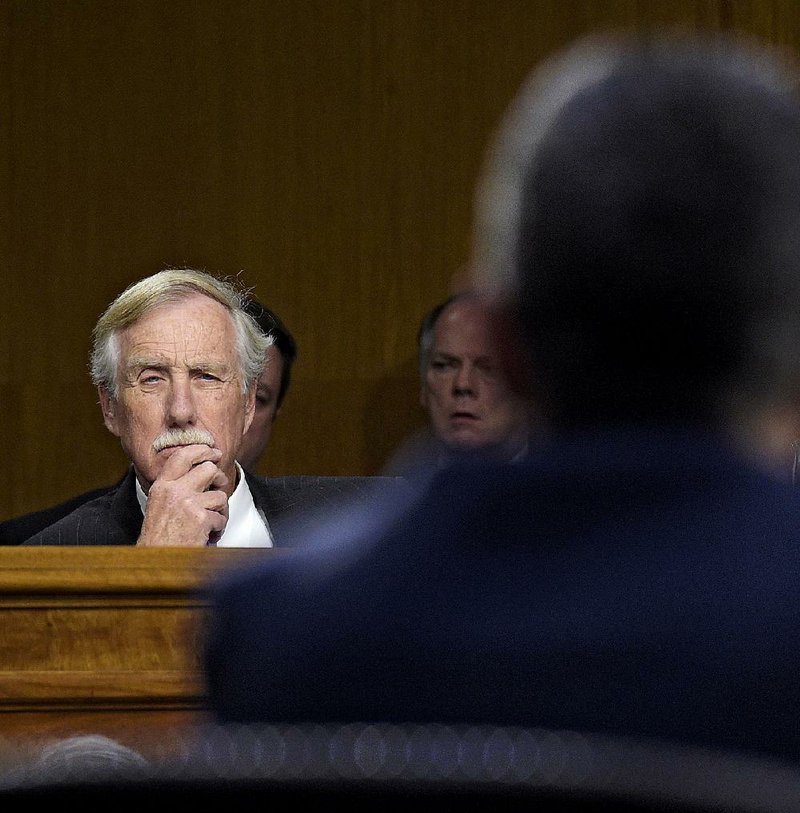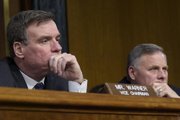WASHINGTON -- Experts on national security painted a sinister picture for senators examining Russian meddling in the 2016 election, detailing the worldwide effect of fake news, smear campaigns and even killings that they say could have ties to the Kremlin.
Clint Watts, a former FBI agent now with the Foreign Policy Research Institute Program on National Security, said the Senate intelligence committee should "follow the dead bodies."
He said several Russians tied to the investigation into Kremlin disinformation activities have been killed in the past three months -- not only in Russia, but in Western countries as well.
Earlier Thursday, Russian President Vladimir Putin again dismissed what he called "endless and groundless" accusations of Russian meddling in the U.S. election, describing them as part of the U.S. domestic political struggle. He also said he is ready to meet with President Donald Trump at a planned Arctic summit.
[PRESIDENT TRUMP: Timeline, appointments, executive orders + guide to actions in first 100 days]
The hearing Thursday focused mostly on how experts say the Kremlin uses technology and disinformation to influence the opinions of Americans and not on U.S. policy toward Russia.
Trump, throughout the campaign and since he's been president, has expressed an interest in improving relations with Russia. Watts said he fears for his own safety after speaking about Russian efforts.
"I'm a little bit lost as to what our interests are or how they're coalescing," Watts said. "My biggest concern right now is I don't know what the American stance is on Russia."
The Senate committee has requested 20 individuals to be interviewed, said Chairman Richard Burr, R-N.C. Five have been scheduled, and the remaining 15 are likely to be scheduled within the next 10 days. Additional witnesses could be interviewed.
While Burr and Sen. Mark Warner of Virginia, the committee's senior Democrat, did not disclose additional people they hoped would testify before the committee, they hinted that list may include Michael Flynn, who resigned as national security adviser over his conversations with Russian Ambassador Sergey Kislyak and his failure to fully disclose those discussions to Vice President Mike Pence.
Flynn's attorney, Robert Kelner, said the former national security adviser was in discussions with the House and Senate intelligence committees on receiving immunity from "unfair prosecution" in exchange for questioning.
"General Flynn certainly has a story to tell, and he very much wants to tell it, should the circumstances permit," Robert Kelner, a lawyer for Flynn, said in a statement late Thursday. The statement went on: "No reasonable person, who has the benefit of advice from counsel, would submit to questioning in such a highly politicized, witch hunt environment without assurances against unfair prosecution."
A congressional official confirmed on condition of anonymity that Flynn made the offer.
Flynn, a retired lieutenant general, was forced out of the Trump administration after it was revealed that he had misled Pence about his contacts with the Russian ambassador after Trump's victory.
Warner's question
During Thursday's hearing, Warner talked about disinformation spread in the final weeks of the campaign through key states such as Wisconsin, Michigan and Pennsylvania. One question he said he wants the committee's investigation to answer is whether Russia would have the ability to do that without the assistance of someone with a deep knowledge of American politics.
Sen. Ron Wyden, D-Ore., raised concerns that the committee's investigation is not focused enough on following the money, which includes looking at the president's finances and those of his business partners. Wyden said fishy real estate deals and money laundering might mean that the "Russian government may be only a step or two away" from American institutions.
Watts and the other witnesses argued that such meddling is only one example of what Russia plans to do with the arsenal of hacking and influence tools it has been building for years.
"Russians could not do this if they started in 2016," said Roy Godson, an expert in Soviet and Russian political warfare and an emeritus professor of government at Georgetown University. "For many, many decades we did not take this stuff very seriously, and they were able to take enormous advantage."
Watts also told the committee that two Republican members of Congress may have been targets of Russian social-media campaigns to discredit them as recently as this past week.
"This past week we observed social-media accounts discrediting U.S. Speaker of the House Paul Ryan," Watts said, adding that in his opinion, Sen. Marco Rubio, R-Fla., "anecdotally suffered" from Russian social-media campaigns against him during his presidential bid.
Watts stressed that Russia had no political allies in the United States and would attack or discredit "people on both sides of the aisle ... solely based on what they want to achieve in their own landscape, whatever the Russian foreign policy objectives are. They win because they play both sides."
But Watts noted that Trump's actions in particular -- such as calling attention to conspiracy theories and tweeting about them -- are helping Russian propaganda efforts succeed in the United States.
"Part of the reason active measures have worked in this U.S. election is because the commander in chief has used Russian active measure at times against his opponents," Watts said, citing the president's history of making claims about voter fraud, former president Barack Obama's birthplace, and a "rigged" election.
At peak times, Watts said, such fake accounts even swarm-tweeted conspiracy theories at the president, in the hopes that he would cite them, lending them credibility and strengthening Russia's ability to sow more discord in the United States.
"Until we get a firm basis on fact and fiction in our own country ... whether it be do I support the intelligence community or a story I read on my Twitter feed, we're going to have a big problem," Watts said.
Warner and Burr have pledged cooperation with each other on the committee's inquiry into Russia's influence during the campaign.
Burr said his committee is dedicating seven staff members to the Russia investigation and is "within weeks" of completing a review of "thousands of pages" of documents provided by the intelligence community. Burr said his panel expects to request -- and receive -- more documents as the investigation continues.
Putin denials
Meanwhile, in Russia, Putin on Thursday emphatically denied allegations of Russian meddling in the U.S. presidential election and said Moscow would maintain hopes of improving relations while waiting for political infighting in Washington to stop.
Putin also said he is ready to meet with Trump in Finland if that country hosts an Arctic leaders' summit.
"We are seeing what's going on. They are preventing the new president from fulfilling his campaign promises on many issues: health care, other issues, international relations, ties with Russia," Putin said in remarks at a forum in the northern Russian city of Arkhangelsk. "We are waiting for the situation to normalize and become more stable. And we aren't interfering in any way."
Putin dismissed what he called "endless and groundless" accusations against Russia.
Pressed about the allegations at the forum by CNBC's Geoff Cutmore, who hosted the discussion, Putin answered by quoting former President George H.W. Bush.
Putin said: "Read my lips: No."
He pronounced the last word in English.
"This anti-Russian card is being played in the interests of some political forces inside the United States with an aim to strengthen and consolidate their positions," Putin said, without naming anyone.
He also warned that the escalation of tensions would contradict U.S. interests.
"I don't think it's in the interests of the majority of the American people to bring the U.S.-Russian relations to absurdity for the sake of domestic politics," he said. "Do we want to completely cut diplomatic relations? Do we want to bring the situation to what it was in the 1960s during the Cuban [missile] crisis? Where do people behaving in such an irresponsible way want to take us all, including the American people?"
Pointing to the attention being paid in the U.S. to Kislyak's contacts with members of Trump's team, Putin criticized attempts to cast the interactions as "some sort of spy action."
"Isn't it nonsense?" he said. "What is the ambassador there for? He's there to speak to people, to maintain contacts with the political elite, with businessmen, with members of the House and the Senate, with administration officials."
Putin noted that U.S. Ambassador John Tefft was attending Thursday's forum and has a chance to meet with Russian government members there.
"We aren't obstructing it, just the opposite, we are helping it," he said.
The Russian leader added that he's looking forward to discussing the issue with U.S. Secretary of State Rex Tillerson if he visits Moscow, noting that it's essential for the CIA and Pentagon to cooperate with their Russian counterparts.
No date has been set for Tillerson to travel to Russia.
Finnish President Sauli Niinisto said his country would be honored to host a summit of Arctic nations' leaders that could be the setting for a meeting between Putin and Trump.
Putin said Russia expects the U.S. political wrangling over the Trump team's connections to Russia to end at some point, opening the way for a constructive summit.
"There are many issues which long have come to a head in the economic and security fields and regarding regional conflicts," Putin said. "We are ready for that discussion. It's necessary for the other side to also show goodwill and readiness for constructive work."
Information for this article was contributed by Deb Riechmann and Vladimir Isachenkov of The Associated Press; by Karoun Demirjian of The Washington Post; and by Steven T. Dennis, Terrence Dopp and Chris Strohm of Bloomberg News.
A Section on 03/31/2017

